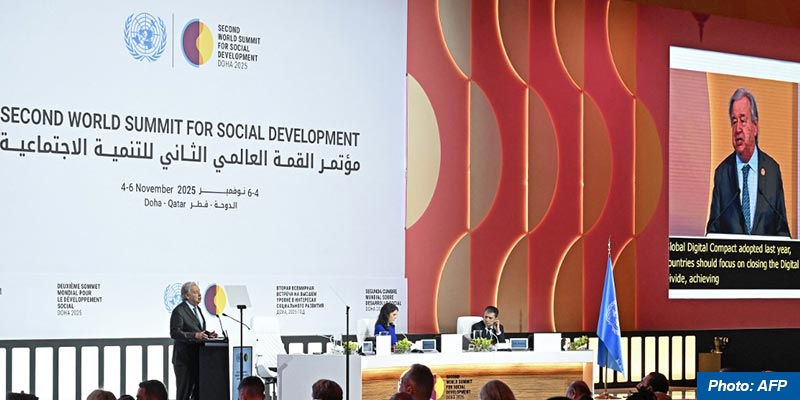- World
- Nov 06
Explainer - Second World Summit for Social Development
• Against a backdrop of escalating geopolitical tension and widening social divides, global leaders at the Second World Summit for Social Development adopted the Doha Political Declaration on November 4.
• The adoption of the Declaration demonstrates a shared pledge by governments to tackle poverty, create decent work, combat discrimination, expand access to social protection, and protect human rights.
Second World Summit for Social Development
• Thirty years after the first World Social Summit in Copenhagen in 1995, global leaders reconvened in Doha to assess progress and chart a path forward on poverty eradication and social development.
• Over the past three decades, 1.5 billion people have been lifted out of poverty, and global life expectancy has increased by nearly seven years.
• However, significant challenges remain, with an estimated 800 million people still living in extreme poverty, according to the United Nations Development Programme (UNDP).
• The United Nations General Assembly decided to convene the World Social Summit, under the title “Second World Summit for Social Development” in Doha, Qatar from November 4 to 6.
• The Summit convened over 14,000 stakeholders under one roof, including more than 40 Heads of State and Government, 170 ministers, leaders of international organisations, youth representatives, civil society actors and experts.
• Building on the 10 Commitments of the 1995 Summit and the Copenhagen Declaration, the Second Summit will accelerate action on poverty eradication, the promotion of full employment and decent work, and social inclusion, ensuring that no one is left behind in an increasingly complex and interconnected world.
Doha Political Declaration
• Named after the city of its adoption, the Doha Political Declaration renews leaders’ commitment to the 1995 Copenhagen Declaration and the 2030 Agenda, centering social development on three mutually reinforcing pillars:
i) Poverty eradication.
ii) Full and productive employment and decent work for all.
iii) Social inclusion.
• The adoption of the Declaration demonstrates a shared pledge by governments to tackle poverty, create decent work, combat discrimination, expand access to social protection, and protect human rights.
• It also emphasises that social development is not only a moral imperative, but also a precondition for peace, stability and sustainable growth.
• It links social justice to peace, security and human rights, vows to leave no one behind, and urges urgent climate action under the UN Framework Convention on Climate Change (UNFCCC) and Paris Agreement, reaffirming the Rio principles, including common but differentiated responsibilities.
• Financing is put front and centre: the Declaration reaffirms the Addis Ababa Action Agenda as integral to the 2030 Agenda, welcomes the Sevilla Commitment to renew the financing framework, and calls for stronger, more representative multilateral institutions.
• Follow-up will be led by the Commission for Social Development, with a five-year review process to assess progress and close gaps.

